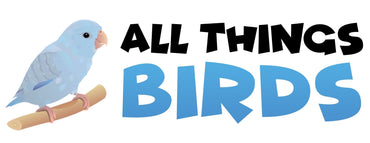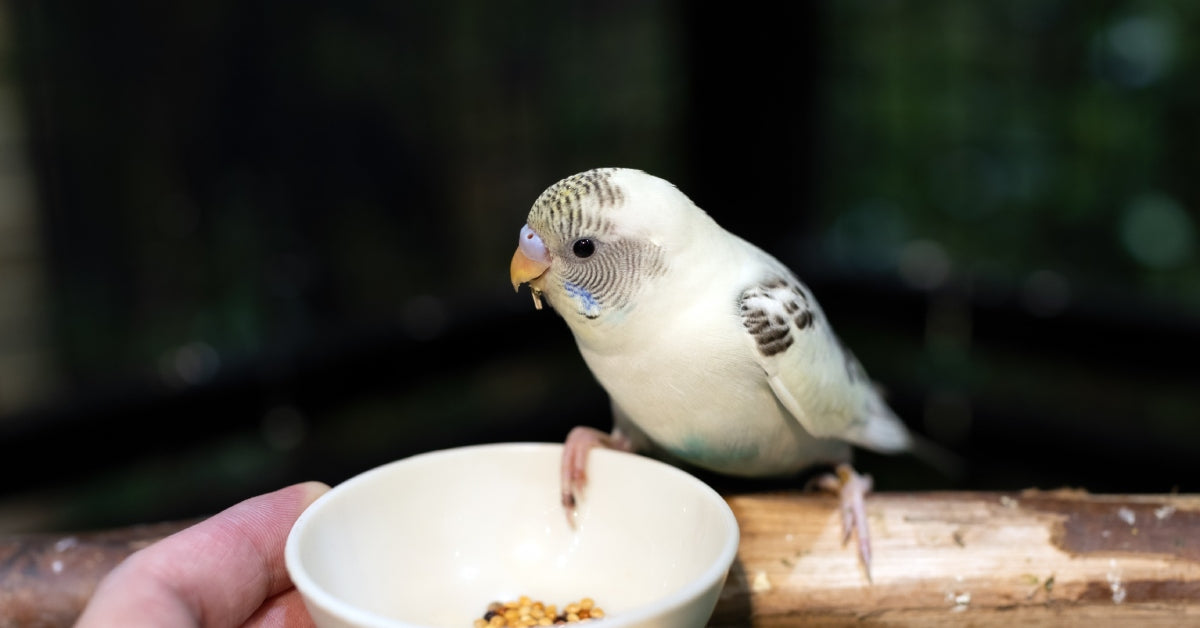Bird nutrition can be pretty complicated, and sadly, there's a lot of bad advice out there. Many new bird owners think a seed-only diet is fine because that's what pet stores have been selling for decades. But this type of diet can lead to health problems for your feathered friends later on.
Of course, no bird lover wants to feed their bird a bad diet. They want their feathered friend to have a healthy diet, complete with the nutrients they need to live long, happy lives. In this bird food guide, we'll break down the essentials of a balanced bird diet and how you can serve it up for your winged buddy.
While each bird species has different dietary needs, generally, a good bird diet is a varied diet. Wild birds have access to a diverse range of foods in their natural habitats, and bird owners should strive to replicate this variety in their captive diets.
Scrumptious Seeds

Seeds are one of the most common foods for birds, and they’re also the easiest to provide. Bird owners can find a wide variety of seed mixes from brands like Kaytee and Volkman at their local pet stores or online.
However, bird owners should be aware that most bird species shouldn't be on a seed-heavy diet. While seeds are a good source of protein and fat, they aren't nutritionally complete on their own. In fact, many seed mixes lack important vitamins and minerals that birds need to stay healthy, such as calcium and vitamin A.
Medium-sized birds and larger birds should usually only have seeds as a small part of their diet. But some smaller birds, such as budgies, finches, and canaries, can have a higher percentage of seeds. This is because these species are granivorous, meaning they primarily eat seeds in the wild.
Types of Seeds To Offer
You should offer a variety of seeds to your bird, as different species have different preferences. General seed mixes include sunflower seeds, millet, safflower seeds, and cracked corn. To improve the nutritional content of a standard bird seed mix, add in flax seeds, hemp seeds, and chia seeds.
You can also provide sprouted seeds for added nutrition. Sprouted seeds have an increased nutrient content and are easier for birds to digest. You can easily sprout seeds at home by soaking them in water overnight and then rinsing and draining them twice a day until they begin to sprout.
Palatable Pellets
Pellets are another common staple in a bird's diet. Pellets are small, round bits of food made from ground-up ingredients, such as grains, veggies, and fruits. They often also feature added vitamins and minerals to make them nutritionally balanced.
Pellets come in different sizes and formulas for various bird species, so take care to choose a pellet appropriate for your bird's size and species. Some popular brands include Zupreem, Harrison's Bird Foods, and Roudybush.
Getting Birds To Like Pellets
Many birds may not take to pellets right away, especially if they've been on a seed-heavy diet their whole life. In fact, sometimes it takes months or even years to fully transition a bird onto a pellet diet!
To start transitioning your bird, slowly introduce pellets into their diet and offer them alongside their usual seed mix. You can also try mixing the pellets with some fruit or vegetable puree or sprinkle some on top of their favorite treats to entice them to try it. There are many different techniques for converting your bird to a pellet-based diet, so experiment and see what works best for your feathered friend.
Flavorful Fruit and Vegetables

In the wild, birds have access to a wide variety of fruits and vegetables that provide important vitamins, minerals, and antioxidants. In captivity, you should mimic this by offering fresh produce as part of their daily diet.
Some popular options include:
- Leafy greens, including kale, spinach, and collard greens
- Colorful fruits, such as apples, pears, and berries
- Crunchy vegetables, especially carrots, bell peppers, and cucumbers
- High-water content fruits and vegetables, such as watermelon, cantaloupe, and zucchini
- Vitamin A-rich options, including sweet potatoes, butternut squash, and pumpkin
Keep in mind that while most fruits and vegetables are safe for birds, there are some that can be harmful, such as avocado, onions, fruit pits, and garlic. Avoid these at all costs!
Tips for Serving Up Produce
Wash all fruits and vegetables thoroughly before offering them to your bird. While you can offer fruits and veggies whole, some birds may have trouble eating them this way. You can try chopping them up into smaller pieces or even pureeing them and mixing them in with their pellets or seeds.
One popular way bird owners serve fruits and veggies to their birds is through something called "chop", which is a mix of different fruits and vegetables finely chopped together. The benefit of chop is that the pieces are so small that birds can't pick out their favorite bits and will have to eat everything together. This ensures they get a balanced diet and can try new fruits and veggies that they may have otherwise avoided. There are many different chop recipes available online, or you can create your own using whatever fresh produce is available.
Powerful Proteins
Birds also need protein in their diets. This can come from a variety of sources such as cooked eggs, lean meats, insects (for insectivorous birds), and even small amounts of cooked beans and legumes.
Avoid feeding birds any fatty or processed meats, as well as any seasoned or flavored proteins. Stick to plain, cooked options without any added salt, spices, or oils.
Tasty Treats
Just like humans, birds enjoy treats too! The key is to offer them in moderation and choose healthy options. Some great treat ideas include unsalted nuts, dried fruits (without added sugars), cooked whole grains, and small amounts of certain human foods such as boiled eggs, cooked sweet potatoes, or sprouted beans.
Supercharged Supplements
In addition to a varied diet, some birds may also benefit from supplements. These can include vitamins, minerals, and probiotics.
Most birds will benefit from access to a cuttlebone or mineral block, as these provide important minerals for strong bones and beaks. Plus, they’re nearly impossible for a bird to overeat. Before giving your bird any other supplements, consult with a veterinarian who specializes in avian health to determine if your bird needs them.
Use this bird food guide as a starting point for planning your feathered friend's diet, but don't forget every bird is different and may have different dietary needs. Observe your bird's health and energy levels and make adjustments as needed. With a balanced and varied diet, you can help your bird live a long, healthy life filled with delicious food options.
If you're looking for commercial seed or pellet mixes, or treats and supplements, come shop All Things Birds! As our name suggests, we’re a bird supply store that specializes in all things related to bird care and nutrition. We carry a wide variety of high-quality bird food products that will keep your pet happy and healthy.
Plus, our team is always happy to answer any questions you may have about bird nutrition and help you find the perfect diet for your specific bird species. We want to see all birds thrive, so let us help you provide the best nutrition for your feathered friend!

